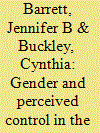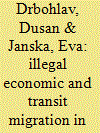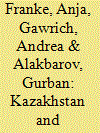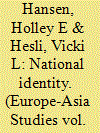| Srl | Item |
| 1 |
ID:
086235


|
|
|
|
|
| Publication |
2009.
|
| Summary/Abstract |
The consequences of the socioeconomic transition for male physical health in Russia are widely documented, but much less research examines psychological well-being and mental outlook, or how these outcomes differ for men and women in Russia. Exploring gender differences in personal control, an important aspect of psychological well-being, we find that, controlling for social and economic factors, Russian women report lower levels of control than men. Gender differences in the social determinants of perceived control highlight the importance of gender roles for understanding psychological stress and inform how social expectations differentially influence men's and women's paths to well-being in Russia.
|
|
|
|
|
|
|
|
|
|
|
|
|
|
|
|
| 2 |
ID:
086245


|
|
|
|
|
| Publication |
2009.
|
| Summary/Abstract |
This article examines the essential features of international migration and the illegal working activities of migrants in the Czech Republic, with a closer insight into the processes of trafficking and smuggling. The research is based on semi-structured interviews with 63 illegal migrants, both from countries of the former Soviet Union (mainly Ukraine) and developing countries in 2005 and 2006. The main conclusion of the analysis is that, in many ways, the situation of illegal labour and transit migration in the Czech Republic is similar to that in countries with a longer experience as target countries for immigration.
|
|
|
|
|
|
|
|
|
|
|
|
|
|
|
|
| 3 |
ID:
086242


|
|
|
|
|
| Publication |
2009.
|
| Summary/Abstract |
This article presents an analysis of two post-Soviet states, Kazakhstan and Azerbaijan, which can be identified as post-Soviet rentier states. Both countries are characterised economically by enormous national resources of gas and oil and low economic diversification as well as politically by strong autocratic presidentialism with neopatrimonial structures. These two factors, combined with further post-Soviet legacies such as a low level of political interest in the respective societies and a basically hierarchical orientation of the population, lead to a specific post-Soviet variety of rentierism. From a political science perspective, this article reveals the impact of resource policies on these comparably new political systems and concludes with a summary of core features of these post-Soviet rentier states.
|
|
|
|
|
|
|
|
|
|
|
|
|
|
|
|
| 4 |
ID:
086240


|
|
|
|
|
| Publication |
2009.
|
| Summary/Abstract |
The role of non-governmental organisations (NGOs) in the development of Russia's civil society has been the focus of academic study since the collapse of the Soviet Union in 1991. In light of this literature, this article aims to assess the impact of the movement that has most often been seen as very promising for Russia's future civil society development-the environmental movement-by utilising research undertaken in Samara Oblast' of the Russian Federation. While the results do reveal some positive contributions to civil society development in Russia, they also exhibit many similarities with other studies in the extant literature, illustrating the relative weakness of Russia's social movements in the area of civil society development.
|
|
|
|
|
|
|
|
|
|
|
|
|
|
|
|
| 5 |
ID:
086232


|
|
|
|
|
| Publication |
2009.
|
| Summary/Abstract |
We challenge the civic-ethnic dichotomy drawn by previous authors and propose a four-category typology of identities based on out-group tolerance and in-group attachment. Drawing from work on national identity formation and nation-building, we test hypotheses about the processes that cause individuals to adopt one identity over others using survey data based on representative samples of five ethnic groups in Ukraine. We find that the effects of socialisation processes vary greatly depending upon ethnic group. Our results challenge some long-held assumptions about the potential destabilising effects of 'ethnic' identities and the degree to which 'civic' identities correspond to values and behaviours supportive of democracy.
|
|
|
|
|
|
|
|
|
|
|
|
|
|
|
|
| 6 |
ID:
086238


|
|
|
|
|
| Publication |
2009.
|
| Summary/Abstract |
The state of democracy in post-communist Europe has been subject to some debate in recent years; but it needs to take account of longer-term trends. The focus here is on how far the EU's political conditionality has contributed to democratic consolidation using an in-depth case study of post-Soviet Latvia. The record of the impacts of conditionality up to EU entry is examined and then attention turns to whether post-accession tendencies have demonstrated any significant changes after the end of Brussels' monitoring. Using a comparative framework, this article shows that the outcome after four years of EU membership is mixed with both positive and negative results. It is concluded that there is no automatic locking-in effect of European integration; and that conditionality assists democratic consolidation more in structural than in attitudinal or behavioural terms.
|
|
|
|
|
|
|
|
|
|
|
|
|
|
|
|